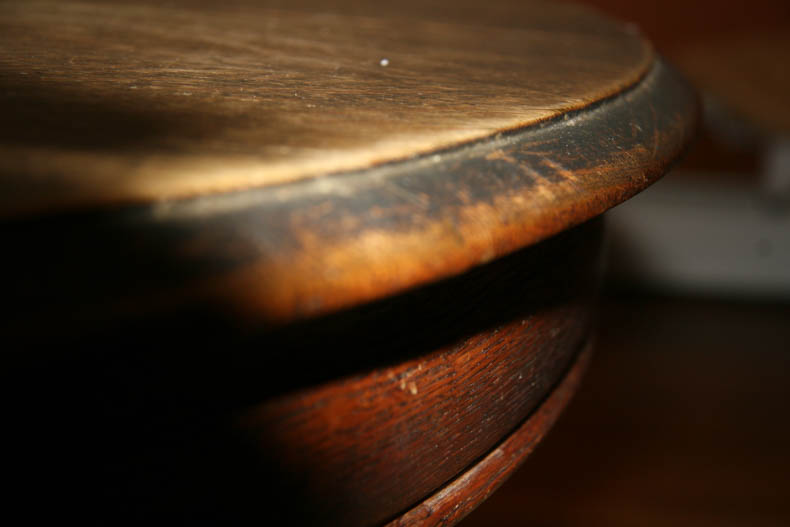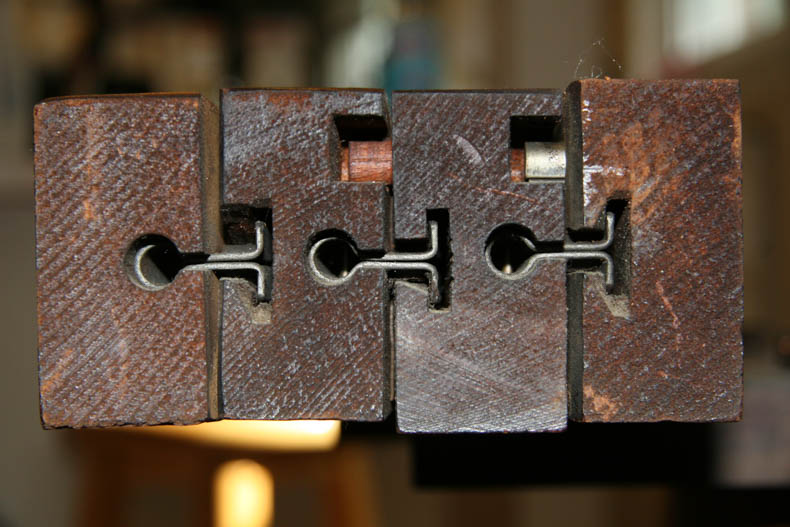
In the summer of 1968, my thirty-something parents bought a 48-inch-diameter round oak pedestal table from an antique furniture dealer in Union, N.J. The moment the table assumed its new position in the kitchen of Solomon and Sylvia’s Victorian home in nearby South Orange, it asserted itself as the center of gravity of the house.
A half-century earlier, master artisans in Hastings, Michigan, built the table with four curvaceous, lion-pawed legs extending from its pedestal’s bottom. They quartersawed the wood to produce a tight “tiger oak” grain pattern and fumed it with ammonia to darken the finish. To Sol, my dad, oak was one of nature’s finest gifts to civilization. Adding to his adoration was the table’s lock-and-release mechanism for inserting and removing leaves. With every swivel of the mechanism’s handle, a reverberant metallic clack advertised a marriage of steel, wood, and good design.
My father’s mother died when he was four. His father, an émigré from the Aegean island of Rhodes, suffered from deafness and diabetes and was unable to care for his three sons. Sol grew up in the Hebrew Orphan Asylum in New York City and then under a series of foster parents. Solidity. Stability. Safety. All of these were absent for young Solomon, but they were all embodied in the table.
As with any table in any other kitchen, the primary duty of the Hasting’s Tyden-Locked Table (the locking system was invented by a man named Emil Tyden, who had made a fortune manufacturing coupling mechanisms for train cars) was to relieve those around it of plates, cups, knives, forks, sugar bowls, newspapers, homework, mail, allergy medicine, calcium supplements, and heart pills. The table hosted the details of our lives that summed into our lives.
In the act of sitting down, my father’s contours would assimilate into the nexus of chair and space and table. And with that complementarity of flesh and wood, he would become the philosopher that he was from birth, by temperament, and by education.
Bearded, with an easy twinkle in his eye, Solomon, so aptly-named, could leap upon the most trivial of conversational openings and weave it into a magnificent dialogue and celebration of mind. For generations of family members and friends, Solomon midwifed unexpected intellectual, philosophical and spiritual discoveries. I like to imagine the table recording our shared narratives into its oak solidity as our words rippled into the wood’s great networks of cellulose and lignin molecules.
At the very end of 2010, my father, a man of a hundred million words, was silenced by a stroke. When I arrived at the hospital, he was in the intensive care unit. Over the first few days of the New Year, our hopes were raised and dashed by the slightest twitch (and then stillness) of a finger or eyebrow or by real or imagined changes in his breathing patterns.
“Say epistemology,” I implored at his bedside about a week into his injury. “Epistemology” is the investigation of how we come to know anything, and it was one of my father’s favorite philosophy topics. “Dad! Dad! Can you say epistemology?” I yelled. His eyebrow arced upward, a familiar sign of interest that emphasized his already formidable forehead. And then, the barest of exhalation, “uh-UH-uh-UH-uh-uh.” Six inarticulate syllables, but with an unmistakable cadence: e-PIS-te-MOL-o-gy.
I was the only one who heard it. It was a final moment of hope. By the end of the second week, my mother, sister, and I decided it was time to withdraw medicine’s heroic measures and to let nature take its course. As my father lay dying, I hoped he was aware, because I knew he would be fascinated and awed by what was happening to him. On the morning of January 24, 2011, I held my father’s hand, told him of all the good he had brought to so many people, and listened as his breath slowed to a stop.
Later, I helped my mother move into a more manageable apartment. I unscrewed the top from the pedestal of the Hastings Tyden-Locked Table, hefted the two pieces and the decades-long roots they had extended into that South Orange house into a van, and replanted this oak table in our home in Maryland where my wife and I raised two of Solomon’s grandchildren. This past summer, my wife and I moved into a vintage home much like the one in which I grew up in South Orange. Now in this new living room of ours, the table continues to host and witness the minutiae of our days.
I think of my father often in January. Like his death, his birthday was in this month, too. Over the recent end year and New Year holidays and celebrations, my wife and I, our two grown boys, their cousins, my sister, mother, and our friends and neighbors all shared moments around this beloved table. In its new location, with those same molecular archives inside of its oaken flesh, I imagine that another generation of everyday histories has begun accreting onto the record of life, love and intelligence that Solomon left there for us.

Photos: Ivan Amato
This is lovely. I have a table like this too (different locking mechanism too) and love the notion of the conversations around it having sunk into its grain.
On this sixth yahrzeit of our father’s passing, I read this homage to our life around our beloved family table where we delved deep into the deepest matter of everything, something, and nothing, where our intellects and hearts formulated, expressed, swelled and kvelled, where notions of significance and the pleasure of silliness created our truth, our belonging and our home. Blessed is the memory of Solomon Amato and our round table of love. Thank you, brother, for this beautiful, imbued essay of remembrance.
Thats just so touching Ivan. As i do remember your father to be a very nice and an intellectual man and every visit to south orange whenever i pass by that house all these years i always mention the Amato house as i pass going from mybparents house to the village. Sadly my father passed summer of 2012 much the same as your father, stroke, icu n praying for a glimmer of hope , something as id read him prayers from the hospital chapel prayer book n then the final words n moments n a tear came from his left eye as i was thanking him for being such a great dad and assuring him we would be ok. I avoid thinking of that As it makes me sad but Sols final moments reminded me of that. N bless his heart how sad losing his mom when he was so young n then the foster homes n i bet he did alot of reading n his best moments no doubt came from being around that table with his family. As solid as that wood. Sounds like a beautiful table too What a nice story , and as i read it i was hoping to hear that the table would indeed wind up with you to be appreciated for years to come and hopefully passed on thru more generations of Amatos. thx for sharing this touching story. God bless you and your family and a warm hi to your dad in heaven :).
Nicely thought, Ivan. Nicely felt and nicely crafted. Thanks for your work, and for following the instinct that lead you to put this together for us to enjoy.
Ivan, beautiful. We talked once about our fathers, soon after their deaths (7th yartzeit for mine is next week). They would have liked each other.
This is really beautiful, Ivan. My father died on almost the same day when yours had his stroke. This is a very fine tribute. Hope we can catch up some time.
Thank you for this, Ivan. Beautifully done. Extraordinary for us to both learn last week that our fathers left this life on the same date (and the date you published this)- mine this year, and yours 6 years ago. I’ve been thinking about how much my dad also appreciated fine workmanship in many of the arts and in general when things were done “right”. As a machinist by training he would have no doubt appreciated your table and as an immigrant from Scotland he deeply felt the value of the few things that his own father of nine had passed on to him. I’m so grateful for his life and for the bond that you and I now have to build on as we miss these men we loved like no other.
Ivan and Mary,
A touching essay. Wisdom imbued in a person and oak, and the memory of a loving son.